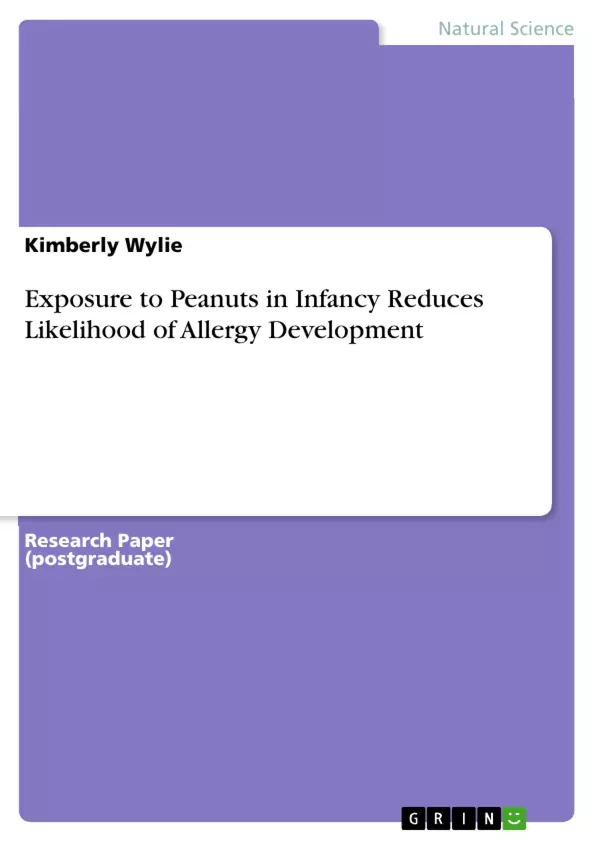Food allergies are an increasing concern in many countries. One of the most life-threatening food allergies is an allergic reaction to peanuts. Rather than continued restrictions as a means of safe guarding those with peanut allergies, exposure to peanuts in infancy could reduce the likelihood that children will develop peanut allergies at all.
Inhaltsverzeichnis (Table of Contents)
- PEANUT ALLERGIES
- EARLIER RECOMMENDATIONS
- LEAP STUDY
- High-risk infants
- Study Design
- Study Results
- SUBCUTANEOUS EXPOSURE TO PEANUT PROTEIN
Zielsetzung und Themenschwerpunkte (Objectives and Key Themes)
The text aims to explore the prevalence of peanut allergies, discuss past recommendations for preventing them, and present recent research findings on the potential benefits of early peanut exposure. The study aims to evaluate the effectiveness of early introduction of peanut protein in reducing the likelihood of developing peanut allergies.
- The Prevalence and Severity of Peanut Allergies
- The Ineffectiveness of Traditional Dietary Restrictions
- The LEAP Study: Early Introduction of Peanut Protein and Allergy Prevention
- Subcutaneous Exposure to Peanut Protein as a Potential Treatment
- The Implications of Research Findings for Public Health and Allergy Management
Zusammenfassung der Kapitel (Chapter Summaries)
- PEANUT ALLERGIES: This chapter introduces the topic of peanut allergies, highlighting their prevalence, severity, and potential life-threatening consequences. It discusses the increasing incidence of peanut allergies and the challenges they pose for individuals and healthcare systems.
- EARLIER RECOMMENDATIONS: This chapter examines past dietary recommendations for preventing peanut allergies in children. It describes the approach of avoiding peanut exposure during pregnancy, breastfeeding, and early childhood, and discusses the limitations of this strategy in preventing peanut allergies.
- LEAP STUDY: This chapter presents the "Learning Early About Peanut Allergy" (LEAP) study, which investigated the effects of early peanut exposure on the development of peanut allergies. It details the study design, participant characteristics, and key findings, indicating that introducing peanut protein early in infancy significantly reduced the risk of developing peanut allergies.
- SUBCUTANEOUS EXPOSURE TO PEANUT PROTEIN: This chapter explores the potential of subcutaneous exposure to peanut protein as a treatment for existing peanut allergies. It describes a study involving injections of peanut extract and discusses the observed changes in tolerance to peanut protein among participants.
Schlüsselwörter (Keywords)
The text focuses on the key topics of peanut allergies, allergy prevention, early exposure, dietary interventions, LEAP study, subcutaneous peanut exposure, anaphylaxis, and public health implications.
Frequently Asked Questions
Can early peanut exposure reduce allergy risks?
Yes, recent research, including the LEAP study, suggests that introducing peanut protein to infants can significantly reduce the likelihood of developing peanut allergies later in life.
What was the LEAP study?
The "Learning Early About Peanut Allergy" (LEAP) study investigated high-risk infants and found that those who consumed peanut protein early had a much lower incidence of allergy than those who avoided it.
Why were earlier recommendations for peanut avoidance changed?
Traditional recommendations to avoid peanuts during pregnancy and early childhood were found ineffective, as the incidence of peanut allergies continued to rise despite these restrictions.
What is subcutaneous exposure in allergy treatment?
It involves injecting small amounts of peanut extract to build tolerance. Research indicates this method may help increase an individual's tolerance to peanut protein.
How severe are peanut allergies?
Peanut allergies are among the most life-threatening food allergies, often causing anaphylaxis, which requires immediate medical intervention.
- Quote paper
- Kimberly Wylie (Author), 2015, Exposure to Peanuts in Infancy Reduces Likelihood of Allergy Development, Munich, GRIN Verlag, https://www.grin.com/document/312533



